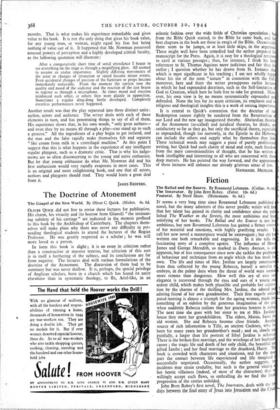The Doctrine of Atonement
The Gospel of the New World. By Oliver C. Quick. (Nisbet. 6s. 6d.
OLIVER Quicx did not live to revise these lectures for publication. His charm, his vivacity and (to borrow from Glanvil) " the insinuat- ing subtlety of his carriage " are indicated in the memoir prefixed to this book by the Archbishop of Canterbury. The chapters them- selves will make plain why there was never any difficulty in per- suading theological students to attend the lectures of the Regius Professor. He was greatly respected as a scholar ; he was still more loved as a person.
In form this book is slight ; it is an essay in criticism rather than a constructive or massive treatise, but criticism of this sort is in itself a furthering of the subject, and its conclusions are far from negative. The lectures deal with various formulations of the doctrine of the Atonement. The discussion of them had to be summary but was never shallow. It is, perhaps, the special privilege of Anglican scholars, born in a church which has found its unity elsewhere than in systematic theology, to flit, Ariel-like, in an
eclectic fashion over the wide fields of Christi'an speculation ; bu from the Bible Quick started, to the Bible he came back, and th best chapters in the book are those in exegis of the Bible. Occasionall there seem to be jumps, or at least little skips, in the argumen These might well have been remedied had the author prepared h manuscript for the Press. Again, it is easy for a theological review to cavil at various passages ; thus, for instance, I think his lat references to St. Thomas Aquinas more judicious and fair than h earlier ; I question whether he has drawn from St. Irenaeus tha which is most significant in his teaching ; I am not wholly happ about his use of the term " nature " in connexion with the Fall moreover, here and there the writer presupposes earlier lectur in which he had expounded doctrines, such as the Self-limitation o God in Creation, which here he feels free to take for granted. More over, his own view is by no means systematically expounded an defended. None the less for its acute criticism, its emphasis and religious and theological insights this is a work of serious importance It is central to Quick's contention that the doctrine of ou Redemption cannot rightly be sundered from the Resurrection our Lord and the new age inaugurated thereby. Abelardian theorie of the Atonement (so-called) and juridical theories, he thinks, ar satisfactory so far as they go, but only the sacrificial theory, especiall as expounded, though too narrowly, in the Epistle to the Hebrew can include the others and supply what by themselves they lac These technical words may suggest a piece of purely profession writing, but Quick had such clarity of mind and style, such freedo from the mere conventionalities of thought, that he has written book intelligible and interesting to all who are concerned with thes deep matters. He has pointed the way forward, and the appearanc of these lectures will enhance our already grievous sense of loss.
,t
NATHANIEL MICKLEM.


























 Previous page
Previous page